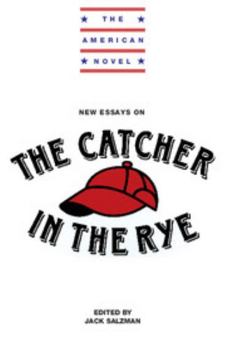New Essays on the Catcher in the Rye
(Part of the The American Novel Series)
Select Format
Select Condition 
Book Overview
First published in 1951, Catcher in the Rye continues to be one of the most popular novels ever written as well as one of the most frequently banned books in the United States. In his introduction to... This description may be from another edition of this product.
Format:Paperback
Language:English
ISBN:0521377986
ISBN13:9780521377980
Release Date:February 1992
Publisher:Cambridge University Press
Length:132 Pages
Weight:1.35 lbs.
Dimensions:0.3" x 6.0" x 8.7"
Customer Reviews
3 ratings
second best book on the subject
Published by Thriftbooks.com User , 19 years ago
You may get something completely different out of this book, but these are the most important points which I got out of the five articles: --Holden's brother escaped growing up by dying at the age of 10. According to Seelye, that is why memories of Allie give Holden such troubled feelings. --Cowan notes that Holden begins the narrative with the words, "I'm not going to tell you my whole goddam autobiography or anything," and promptly proceeds to do exactly that. --The child who was singing "Coming through the rye" was walking in a straight line, and was thus protected from the danger of passing automobiles. Cowan sees this as symbolic. --Cowan comments on the "adult diction" which Holden uses in the presence of adults. --Holden once attended a public speaking class in which the class members shouted "Digression!" at appropriate times. According to Cowan, Holden trusts his present listeners not to do that. --Holden confesses, "I'm the most terrific liar you ever saw in your life," yet all of his lies take place in the narrative past. Cowan sees this as a change on Holdon's part. --Cowan lists the fencing foils, the record for Phoebe, and his younger brother as items which Holden is unable to keep from losing. Holden's name might be a pun on "hold on." --Brookeman is keen on source material. The movie quote, "He doesn't want me to be a tap dancer. He wants me to go to Oxford" is from "Ziegfeld Follies" starring Fred Astaire and Lucille Ball. The name for Bernice Krebs, a character introduced on page 73, comes from a Hemingway short story about a soldier who returns from World War I and tries to adapt to civilian life. --Regarding the duck dilemma, Rowe sees a dichotomy between freezing and freedom. Compare this with Cowan's suggestion of death in general and Allie's death in particular. --The mummies in the museum are peaceful. According to Shaw, that is why mummies are the only item which Holden can remember on the exam question about Egypt. --Shaw suggests that Holden is avoiding success because he feels guilty for surviving Allie. He calls attention to a passage in which Holden ascribes guilt to Romeo for surviving Mercutio. --"Meet[ing] a body" could imply romantic relationships with girls. According to Shaw, this could be the reason that Holden remembers the lyrics incorrectly. --Finally, Shaw asks who is crazy, Holden or everyone else. I have seen one book which is more helpful in interpreting "The Catcher in the Rye," and that is the Simonson & Hager essay collection, 0669215686.
Does "The Catcher in the Rye" catch your eye?
Published by Thriftbooks.com User , 21 years ago
When I finished the book "The Catcher in the Rye," my initial thought was, "Did I like this book or not?" It was hard for me to figure out. Even though I felt like there wasn't a complexed or structural plot, I still couldn't put it down. Maybe it was the easy-to-relate-to memories of Holden Caulfield, or maybe it was the depth in character that was described. "The Catcher In the Rye" is based on innocence in childhood and a boy who is afraid of the corrupt world of adulthood. Throughout the novel, I got an understanding of what Holden Caulfield was like. The characterization is accurate and it could definately be a real person; Holden's thoughts were consistant with his personality. Holden uses defense mechanisms to get away from the real world in which he fears so much by having an extremely negative attitude and putting other people down by saying they are "phony". All Holden wants is security without change. This is demonstrated with the museum he like has liked ever since he was a little boy. He likes it because it is something that never changes over time and stays innocent. Also, throughout this novel, if you pay attention, you can see that everything is linked to everything else. Holden's red hunting hat relates to his brother's and sister's hair for example. This book is filled with symbolism, complexity, and a sense of human nature. My conclusion was that I definately do like this book. It was intriguing to read into someone else's life and see things from a different perspective. If you are someone who enjoys suspense and structural plots, this is not a book I would recommmend for your reading. If you are someone who likes to relate to characters and see out their eyes, this is the book for you.
never judge a book by its cover!
Published by Thriftbooks.com User , 23 years ago
All i can say is WOW! In the beginning i was like, "the catcher in the rye"? Sounds like a book about farming. Boy, was i wrong. Salinger caught my attention from the first page and kept it until the very last. Holden brings to the surface everything we(especially teenagers)think but never dare to say. I liked this book cause it's down to earth, not at all "phony" (as Holden would say), and teaches you a great deal about life. Now, the fact that it was found in the pocket of the guy who murdered John Lennon is another story....





